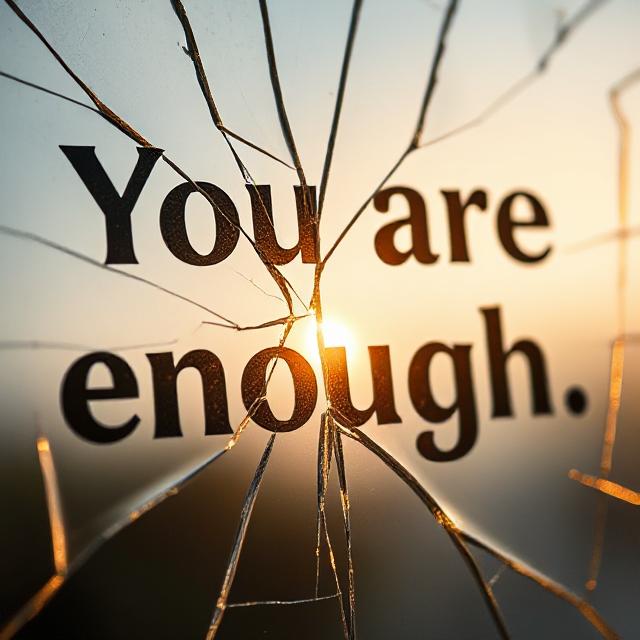
Introduction
“You are enough.”
You’ve seen this phrase everywhere—on Instagram captions, in self-help books, even plastered on motivational posters. It’s meant to be empowering, comforting. But what if this idea is actually holding you back?
The belief that we’re already “enough” suggests we don’t need to change, improve, or push ourselves further. It tells us that where we are right now is sufficient—even when, deep down, we know we’re capable of more.
Self-acceptance is important, but growth comes from acknowledging that we’re not enough—at least, not yet.
Think about a time you struggled—maybe you were bullied, left out, or made to feel small. In that moment, hearing “You are enough” might have felt hollow. What you really needed was the strength to rise above, to prove you could be more than what others made you feel.
This isn’t about tearing yourself down. It’s about breaking free from the limitations of complacency and embracing the power of growth. Because true fulfillment doesn’t come from being “enough”—it comes from striving for more.

Why We Feel “Not Enough”
Many students (and people in general) struggle with self-doubt. This feeling doesn’t appear out of nowhere—it’s shaped by:
1. The Education System
- Schools prioritize grades over learning, memorization over understanding, and competition over collaboration.
- If you work hard but score lower than peers, you might think, “I’m not smart enough,” even if you have untapped talents.
- Rarely are students taught resilience, self-worth, or the value of learning beyond tests.

2. Social & Environmental Pressures
- Success is often measured by grades, prestigious careers, or financial status.
- Social media bombards us with highlight reels of others’ achievements, making us feel inadequate.
- Seeing peers excel while you struggle can reinforce the belief: “I’m not enough.”

3. Cultural & Family Expectations
- Many cultures tie self-worth to academic/career success.
- Parents may compare you to others, pressuring you to meet unrealistic standards.
- Instead of recognizing your unique strengths, you feel forced into a mold just to be “worthy.”

Why This Mindset Is Holding You Back
1. The Illusion of Self-Sufficiency
Imagine if a baby decided, “I’m enough,” and stopped learning to walk. Or if a student thought, “I’m fine as I am,” and never studied harder.
Growth is human nature. We’re wired to evolve.
- Example: Elon Musk didn’t stop after PayPal—he kept learning, failing, and building Tesla and SpaceX.
- For students: If you get an average grade and think, “This is all I can do,” you’ll stay stuck. But if you seek help, practice, and push yourself, you’ll improve.
How to break free:
✔ Find mentors (teachers, seniors, experts).
✔ Join study groups—learning from others speeds up growth.
✔ Set small weekly goals—track progress instead of staying stagnant.
2. The Problem with Stagnation
When you believe you’re “enough,” you stop pushing yourself. Comfort becomes a trap.
- Example: Staying in a toxic relationship or dead-end job because “It’s fine.”
- For students: Avoiding difficult subjects, sticking to bad study habits, or refusing to ask for help keeps you stuck.
How to break free:
✔ Challenge yourself—tackle harder problems.
✔ Step out of your comfort zone—join debates, competitions, or new activities.
✔ See failure as feedback—not proof you’re inadequate.
3. Growth Comes from Acknowledging Weaknesses
Nobody is perfect. The first step to improvement is admitting where you fall short.
- Example: If you’re bad at public speaking, saying “I’m enough” won’t help. But practicing will.
- For students: Avoiding weak subjects (“I’m just not a math person”) keeps you stuck. Effort beats talent.
How to break free:
✔ Identify weak areas—spend extra time on them.
✔ Ask for feedback—teachers, peers, mentors.
✔ Try different learning methods—videos, discussions, practice tests.
4. Learning from Failure & Criticism
Michael Jordan was cut from his high school team—he didn’t quit. He used failure as fuel.
- Constructive criticism isn’t an attack—it’s a growth tool.
- A bad grade doesn’t mean you’re not smart—it means you need a better strategy.
How to break free:
✔ Review mistakes—understand why you failed.
✔ Accept criticism—use it to improve.
✔ Keep a failure journal—track lessons learned.
The Power of External Influence
1. Mentorship & Relationships Matter
- No one succeeds alone.
- Example: Steve Jobs and Bill Gates pushed each other to innovate.
- For students: Studying alone limits growth—study groups, mentors, and discussions help.

2. The Danger of Isolating Yourself
- Believing “I’m enough” can make you reject feedback and avoid challenges.
- For students: Ignoring advice or refusing group work keeps you stuck.

3. Discomfort = Growth
- Pain, struggle, and challenges are the best teachers.
- Example: Being bullied can either break you or motivate you to build confidence.
How to break free:
✔ Use past struggles as motivation.
✔ Lean into discomfort—it means you’re growing.
✔ Remember: Nothing worth achieving comes easy.

You Are a Work in Progress
1. Never Stop Learning
- Warren Buffett reads 5 hours a day—despite being one of the richest men alive.
- The world evolves. If you stop learning, you fall behind.
For students:
✔ Read daily—books, articles, educational content.
✔ Ask “why” and “how”—don’t just memorize.
✔ Stay curious—learning is a lifelong journey.

2. Set Goals & Keep Evolving
- Without goals, you drift.
- Example: A student who improves time management sees grades rise.
How to break free:
✔ Set SMART goals (Specific, Measurable, Achievable, Relevant, Time-bound).
✔ Break big goals into small steps.
✔ Review progress regularly.

Conclusion: “You Are Not Enough—Yet.”
Instead of saying, “I am enough,” try:
“I’m not enough yet, but I’m getting there.”
This mindset opens the door to growth, learning, and achievement.
Life isn’t about being perfect—it’s about getting better. Every failure, challenge, and setback is an opportunity to grow.
So don’t settle. Don’t let past struggles define you. Push yourself, learn from your mistakes, and become the best version of yourself.
Because the truth is—you’re not enough yet.
But you can be.



It’s fascinating how gaming tech is evolving! Seeing platforms like phlboss games embrace AI for recommendations & security is a game-changer. The focus on a smooth Filipino experience is smart – innovation and cultural relevance! ✨ phlboss games
Really enjoying this article! The speed and security of modern platforms are game-changers. Heard 33wim play is pushing boundaries with biometric verification – instant access sounds amazing! Definitely a step up for Vietnamese players.